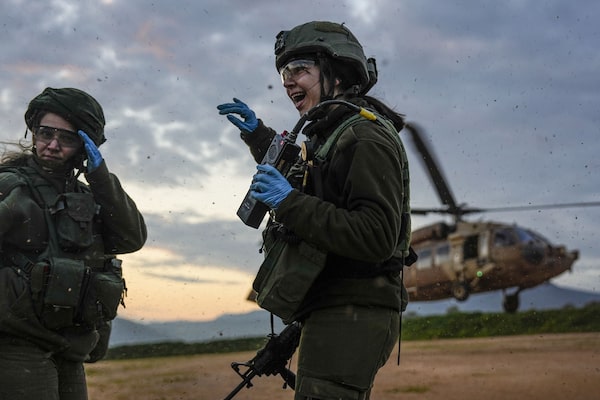
Israeli female paramedic soldiers take cover from the wind made by a landing military helicopter during an exercise simulating evacuation of wounded people in northern Israel, near the border with Lebanon on Feb. 20.Ariel Schalit/The Associated Press
Israel’s defence minister vowed Sunday to step up attacks on Lebanon’s Hezbollah militant group even if a ceasefire is reached with Hamas in the Gaza Strip.
Hezbollah, which has been exchanging fire with Israel throughout the war in Gaza, has said it will halt its nearly daily attacks on Israel if a ceasefire is reached in Gaza.
But Israeli Defense Minister Yoav Gallant said that anyone who thinks a temporary ceasefire for Gaza will also apply to the northern front is “mistaken.”
“We will continue the fire, and we will do so independently from the south, until we achieve our goals,” Gallant said. He said there is a simple aim: to push Hezbollah away from the Israeli border, either through a diplomatic agreement or by force.
Hezbollah began striking Israel almost immediately after Hamas triggered the fighting in Gaza with a deadly attack along Israel’s southern border from the Gaza Strip on Oct. 7. Tens of thousands of civilians on both sides of the Israel-Lebanon border have been displaced by the continued cycle of Hezbollah rocket and missile attacks and Israeli air strikes and artillery fire.
Hezbollah leader Hassan Nasrallah said in a speech earlier this month that the group would adhere to a ceasefire in southern Lebanon if a ceasefire should be reached in Gaza. But he said it would resume and escalate attacks if Israel continued to strike in Lebanon after any agreement with Hamas.
A Lebanese security official said Sunday that five Hezbollah members were killed in two separate Israeli air strikes on trucks in the border area between Lebanon and Syria. The official spoke on condition of anonymity because he was not authorized to share the information with journalists. Hezbollah announced that three of its fighters had been killed, but did not say where.
The Israeli military did not acknowledge the strikes on the Lebanon-Syria border but announced that it had struck several sites in southern Lebanon in response to missile launches and that it targeted a “terrorist cell” in the town of Blida.
Gallant said Israel’s targeting of Hezbollah commanders has significantly weakened the group’s ability to attack Israel.
About 200 Hezbollah fighters and 35 civilians in Lebanon have been killed in nearly five months of daily low-level clashes between the Lebanese militant group and Israeli forces against the backdrop of the Israel’s war with Hamas, a Hezbollah ally. In Israel, nine soldiers and nine civilians have been killed in Hezbollah attacks.
Most of the fighting between Hezbollah and Israel has been confined to the area within a few kilometres on either side of the border.
Diplomats from the United States and European countries have presented a series of proposals in hopes of producing a deal that would tamp down the border conflict.
The ideas mostly hinge on a Hezbollah pullback a few kilometres from the border, a beefed-up Lebanese army presence in the border region, and negotiations over border points where Lebanon maintains Israel has been occupying small areas of Lebanese territory since withdrawing its forces from the rest of southern Lebanon in 2000.
Eventually, the plans could lead into a demarcation of the land border between Lebanon and Israel, following the maritime border deal reached in 2022.
The most recent of these proposals, put forward by France, would involve Hezbollah withdrawing its forces 10 kilometres (6 miles) from the border, said a Lebanese government official who spoke on condition of anonymity because they were not authorized to discuss the negotiations.
Lebanon is still studying the proposal, and Hezbollah officials have indicated they are willing to consider it, but both government and Hezbollah officials have said there would be no agreement on the border before there is a ceasefire in Gaza.